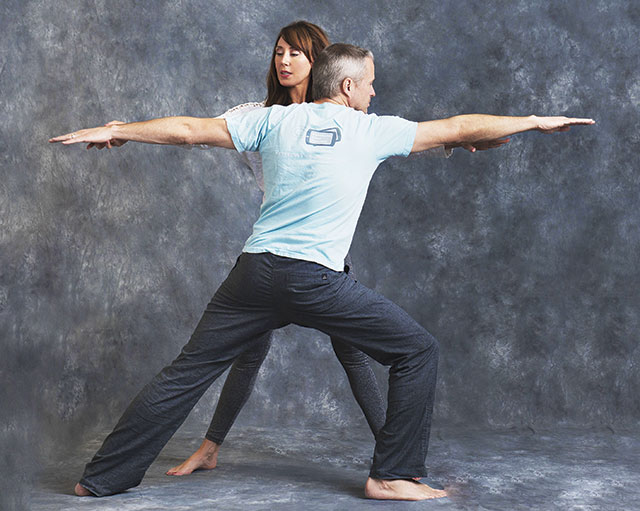
By Raquel Jex Forsgren, Yoga Therapist, C-IAYT
“Are you one of those yogis?” A question that I frequently hear after I tell someone what I do for a living. I can hear in the tone that it’s a bit of a loaded question.
I admit that it used to ruffle my feathers. I’d think a few things: What is that supposed to mean? No, I’m not one of those yogis!
Until now.
I was inspired to write about this from a conversation with a dear soul, Kristy, who is a year into her yoga journey. We were talking about the small, yet transformational changes that happen along the way without realizing it, until one day you notice you are reacting differently, sleeping better and have less anxiety. You begin to notice how feelings and emotions arise, like joy, peace and contentment, each coming from within.
She said, “It feels surreal and almost indescribable.”
I said, “My dear, this is called being awake and feeling bits of enlightenment.”
Why is yoga a path to enlightenment or being awake?
First, let’s just address the word, enlightenment. This has traditionally been a word reserved to describe monks, yogis that sit on mountain tops or those living on an ashram. It’s a word that some would argue doesn’t exist and to others, something they strive for all their lives. Which, if you are reading Conscious Community Magazine, you probably fall into the latter.
Enlightenment is defined as education or awareness that brings about change. To those who more spiritually attuned, there are complex and deeper meanings, such as in Theravada Buddhism. It is associated with the perfection of insight into the Four Noble Truths, which end dukkha (suffering, stress, dissatisfaction.) The person who has perfected this insight and abandoned all defilements is one who is liberated and considered awake.
“Seek not to learn the sutras, instead seek to learn who is the one who studies the scripture.”
How Does Yoga Help Us Find Moments of Enlightenment or Become Awake?
To PRACTICE Yoga is to live a life following the Eight Limbs of Yoga as described by Patanjali. Yoga is so much more than practicing poses or meditating. It’s a way of life.
Yogis follow the Yamas or restraints. These ethical principles underpin the foundation that Yoga is built on. They guide us to practice non-harming, truthfulness, non-stealing, sexual moderation and non-grasping.
Yogis practice the Niyamas or observances. There are practical ways of living, that a Yogi will cultivate such as purity, contentment, discipline, self-study and devotion.
Yogis do Asanas anywhere and anytime. Yoga is about more than practicing Asanas to uplifting or relaxing music in a yoga class. Asanas help prepare the body and mind for meditation and teaches us how to connect to and listen to what it is telling us, particularly about emotions that arise during a pose.
Yogis work to master Pranayama. Controlling the breath controls our mind, and ultimately, can help us reduce our own suffering. Yogis cultivate a mastery over their own breathing by practicing a variety of breathing techniques.
Yogis aim to integrate Pranayama or sensory withdrawal. Have you ever turned your phone off for an entire evening or not looked at social media for an afternoon? Or, have you ever noticed how you feel when you have practiced yoga Asanas, gone for a run or just woken up in the morning without having all the electronics on? This is sensory withdrawal. It’s reducing the stimulation from the outside world that we are constantly receiving so that we can tune inward to hear ourselves.
Yogis are open to learning and loving meditation. They’ve found it is an essential pathway to peeling back layers to what is beneath our feelings and changes our reactions and responses to life. Meditation can be challenging, but it doesn’t have to be. It’s not always about sitting in a cross-legged position, void of thought. Meditation is about going inward, allowing whatever your thoughts are to move and process.
The science behind meditation is on fire. Why? Because scientists and researchers have done imaging on brains of meditators and non-meditators and found meditation changes neuronal pathways in the brain. This changes the patterned behaviors of response within our brain, so we begin to react differently to things that may have once disturbed us.
So, when people ask me now, “Are you one of those yogis?” I think to myself and say to them,”I am on a daily journey aspiring to be.”
Raquel Jex Forsgren is a Certified Yoga Therapist, C-IAYT. She is a graduate of the Soul Institute, certified by the International Association of Yoga Therapists, holds a Bachelor of Science in Biology, and has 25 years of experience in pharmaceuticals. Raquel has been living Yoga for over a decade. She currently lives in Chicago. You can reach her at livingyogatherapy@gmail.com and follow her @yogawithraquel on Instagram. Visit www.livingyoga-therapy.com.
Sources: The Yoga Journal, 2018; Patanxxjali’s Yoga Sutra; The Secret Power of Yoga by Nischala Joy Devi
 Conscious Community Magazine Dedicated to Elevating Consciousness
Conscious Community Magazine Dedicated to Elevating Consciousness




